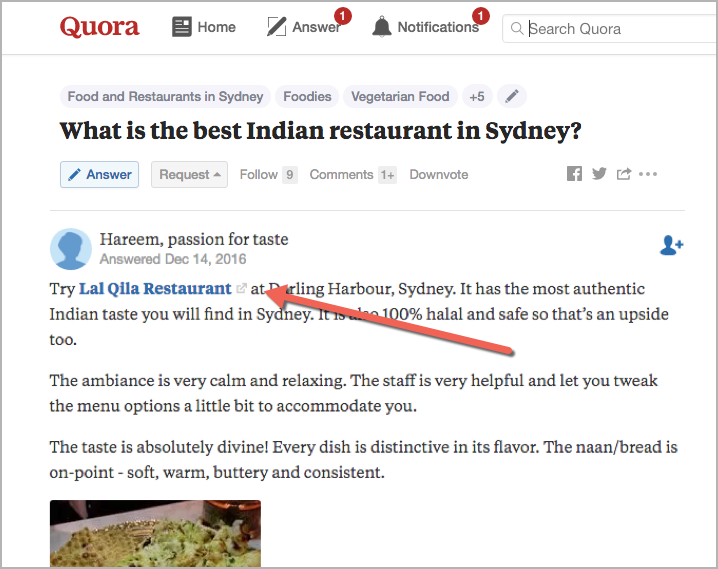— October 20, 2017

Link building is regularly a hot topic among marketers and SEO professionals alike.
While some call this practice obsolete, others claim that it’s one of the most efficient ways of boosting your search ranking.
So, who should you believe?
In all honesty, search engines didn’t do a very good job at clearing up the confusion. Yes, bad links can affect your traffic and profits, but how can you tell for sure what qualifies as a spammy link building strategy?
After all, a couple of years ago, Matt Cutts claimed that guest blogging is frowned upon by Google and businesses that use this tactic may lose their rankings. But SEO agencies still use this tactic prolifically to boost rankings.
With so much confusion around the topic, it should come as no surprise that a lot of businesses would rather avoid link building than waste time and resources cleaning up bad links.
But, that’s not an effective strategy either. As frustrating as it may be, backlinks are an essential ranking factor, and your ranking can significantly impact the success of your company.
To help you make some sense of this dilemma, here are 9 link building tactics that you should definitely avoid in 2017.
1. Buying links
You have to spend money to make money. However, this old business truism doesn’t apply to link building.
You will find enough so-called SEO gurus telling you that buying links is not that bad. It’s just a way to help you get the ball rolling and fake it until you make it. In reality, however, buying links was a bad idea then, and it is a bad idea now.
Ethics aside. This tactic is also inefficient and can get your site penalized. The new Penguin algorithm is now real-time, meaning that if you are caught using controversial link building practices, you will see a drop in rankings immediately.
Instead of buying links, look to earn them by investing your money in other marketing strategies and focus on creating great content that will naturally build links to your site.
If people approach you out of the blue with the opportunity to buy links, chances are the links they get for you will do more harm than good for your site in the long run.
As the old saying goes, if it looks like a duck, walks like a duck, and quacks like a duck… it is a duck!
2. Relying on press releases
Mass press releases used to be a link building staple for SEO agencies and internet marketers alike, but Google caught on.
Sending out press releases from time to time is not a bad idea, but it can’t be your primary link building tactic. In fact, Google’s algorithm devalues the distribution of content to press release websites. In other words, the links you get from releasing mass press releases will pass on minimal (if any) SEO value to your website.
When something newsworthy occurs, sure, feel free to create a press release and send it out to relevant platforms that are likely to pick it up. But abusing this method for every minor thing that happens in your company can be considered spamming.
3. Getting lots of low-quality links
Low-quality links are a real show-stopper when it comes to a website’s development. Try to think about it this way: would you like prospects to associate your business with sloppiness and unprofessionalism? Of course, not. Well, that’s what happens when they learn about your company and products from low-quality sources.
More importantly, Google feels this way too. If your link profile is littered with low-quality websites, Google will consider your website as low-quality too. Goodbye rankings.
Be wary of websites that have low-quality content or, worse, no content at all. Use Google Link Count to check if a certain website is worth your attention. As a rule of thumb, a high number of links paired with a lack of original content indicates a low-quality platform. Avoid acquiring backlinks from these places.
Another reliable tool for determining the quality score of a website is Moz’s Open Site Explorer, which ranks a website from 0 to 100 based on their link profile. Anything above 25 is a good authority score from Moz, but your aim should be to get into the 50+ range.
Here is a report using Yelp as an example:

4. Using or creating PBNs
PBNs (Private Blog Networks) have been a go-to link building tactic for years for many traditional SEO consultants and hardcore search engine marketers. However, in 2017, they are just as irrelevant as the other tactics in this list. (In fact they have been irrelevant for several years)
Basically a PBN is a network of blogs that have been solely created for the purpose of building links between each other, and to other websites. They are basic websites, disguised as blogs, that Google has blacklisted based on their linking activity. Usually if people are selling links they are selling them to be used on a PBN.
If the PBN has avoided Google’s blacklist for now, you may see an intermediate uptick in search rankings when they link to you. But the Google crawlers and team are constantly on the lookout for these platforms, and if they get found out, your site will too. So it’s best to avoid them.
5. Over-optimizing anchor text
Old habits die hard. The same stays true when it comes to optimizing your content for SEO. A lot of businesses (and agencies) still tend to stuff their anchor text with keyword-rich terms when getting backlinks. This practice is seen as “unnatural” by the Google algorithm.
The reason people do this is because the words used in anchor text used to influence the speed at which Google’s crawlers would index the link, and subsequently give your linked page a rankings boost.
Instead of trying to force keywords into your anchor text, make sure that they flow naturally and are relevant to the content. For example, one study found that links with the full page title as the anchor text actually have the greatest influence on ranking.
6. Getting out-of-context links
Links are not created equal. A non-contextual link, for example, will look out of place and completely detached from the content. Since this link is not integrated with the content, people will perceive it as irrelevant.
What is an “out-of-context” link? It can be a number of different things. But put simply, if the link doesn’t naturally flow from the page and content it is coming from, as well as the anchor text, then it would be considered out of context.
Out of context links bring no value to your audience or your business, and they can actually negatively affect your SEO rankings.
7. Participating in link exchanges
A link exchange is when you deal directly with another website and agree to exchange links between each other. “You give me one and I’ll give you one”.
While this may seem harmless on the surface, it is considered an unnatural link building tactic which can affect your rankings if you do it regularly. Google can recognize if there is a high number of transferred links between websites and will penalize them.
The idea behind a link exchange might seem simple, but in reality, it can be extremely difficult to find a platform with a similar audience as your own and then convince them to partake in the exchange. Not to mention the flow on effect it can have on your SEO performance. It’s best to avoid this tactic and stay safe.
8. Using forums and blog commenting
Of course, forum or blog commenting isn’t exactly bad, as long as the comment is relevant to the thread and feels like a remark someone would genuinely make. But if you use this tactic just to promote your business and link to your products, webmasters will see it as spam and delete your inputs. Plus, the Google algorithm has significantly devalued the importance of comment and forum links, so the effort needed to build these links is disproportionate to the outcome you will get.
If you choose to link back to your website, then you should ensure that the comment is personalized, helpful, and, most importantly, relevant to the topic.
Like this example from Q & A forum Quora:

9. Getting too many links at once
Google appreciates a slow and steady growth, as opposed to an overnight expansion. If you acquire too many links over a brief period, it might indicate to Google that you are spamming. That could get you a penalty and a dramatic loss of traffic and rankings.
I know how it feels to be a small business, eager to get the word out about your products or services. But, don’t go overboard with link building. Build up your ranking slowly by mixing link building with other organic strategies, such as content marketing, keyword optimization, social media marketing, and so on. Growing a business online is a long-term process. Trying to skip the development stages will likely do more harm than good.
Time to implement
So there you have it: 9 link building tactics you should avoid in 2017. Don’t think that you can fool search engines and get a jump start by using these practices in the early stages of your business. These tactics have been around for awhile, and search engines have become extremely efficient at identifying them.
With the right strategy in place, link building can help boost your ranking, drive traffic to your site, and establish yourself as an industry expert. But, you have to focus on providing high-quality content to your audience, only request links from high-quality websites, and use different tools to optimize your SEO strategy.
You can’t cut corners when it comes to link building. It will most likely take time for your website to reach a top position, but a steady growth is often one that brings the most benefit.
Digital & Social Articles on Business 2 Community
(51)
Report Post






